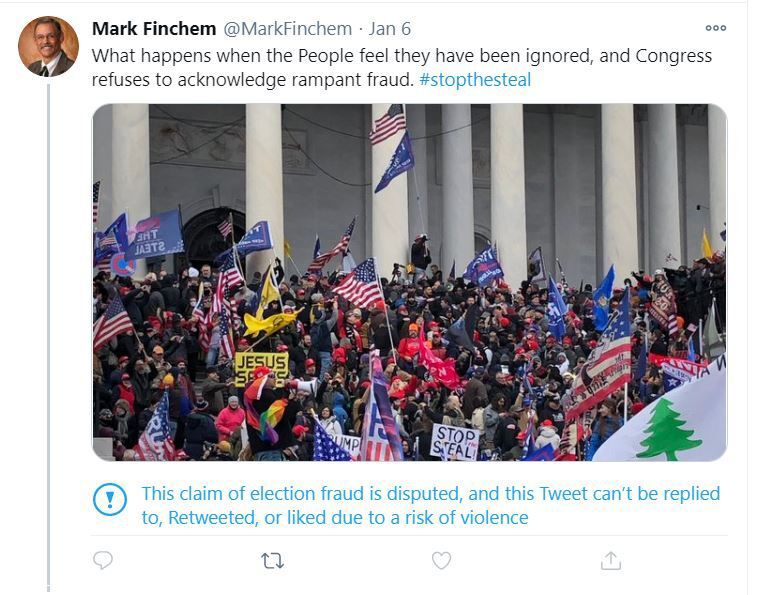PHOENIX — Attorneys for three elected officials told a judge Wednesday he has no legal authority to keep their names off the 2022 ballot, regardless of any roles they may have played in planning and promoting the Jan. 6 rally that turned into a riotous invasion of the U.S. Capitol.
Lawyer Jack Wilenchik, who represents state Rep. Mark Finchem, R-Oro Valley, does not dispute that Congress enacted a provision of the 14th Amendment in the wake of the Civil War that says anyone who has taken an oath to support the U.S. Constitution cannot serve in public office if they “have engaged in insurrection or rebellion against the same, or given aid or comfort to the enemies thereof.’’
But he told Maricopa County Superior Court Judge Christopher Coury that only Congress can authorize how that provision is enforced.
“And as we sit here today, Congress has not authorized any enforcement other than through a criminal proceeding and a conviction, which we do not have here,’’ Wilenchik said.
That, he said, precludes the lawsuits that are trying to keep Finchem from running for secretary of state and Arizona Republican U.S. Reps. Paul Gosar and Andy Biggs from seeking reelection due to the Jan. 6, 2021, events.
Alexander Kolodin, who represents Gosar, said there’s a separate problem with the challenge to the candidates: a lack of any proof of criminal action.
“Attempts to subvert the existing structure of government cannot, in and of themselves, become a crime,’’ he said. Instead, Kolodin said the activity only becomes criminal if it was carried out through unlawful means such as the invasion of the rights of others through force or violence.
“It is absurd to claim that a sitting member of the United States Congress advocated for the overthrow of the United States government,’’ he said. “In fact, there are not even any specific allegations as to Congressman Gosar to that effect.’’
Nor, said Kolodin, is there a claim that Gosar incited the riot.
“In fact, he’s not alleged to have called for violence at all except in some speech before the Capitol riot where he said, ‘A civil war is coming. We just haven’t started shooting yet,’ ‘’ Kolodin said. He said that doesn’t fit any definition of incitement.
But Jim Barton, representing Free Speech for People, the organization that is trying to get the judge to disqualify the trio from running, said the lack of a criminal conviction is legally irrelevant.
“We’re not alleging anyone committed a crime,’’ Barton told the judge. “We’re alleging they were involved in something, were engaged in something that was an uprising against the federal authority of the United States and targeting a core constitutional function of the United States.”
He said that includes claims they helped plan and promoted the rally outside the White House and supported “the mob’’ that went to the Capitol.
Finchem was part of that crowd, though he insists he never entered the Capitol.
The lawsuits say that Gosar and Biggs, who were inside the Capitol that day trying to block the certification of Joe Biden’s presidential election, also were involved in the planning of what occurred outside.
Barton conceded he may not have all the evidence he needs to prove his claims, at least at the moment.
“We’ve been trying to get discovery, get the communications that will give us more information about it,’’ he told Coury. That includes attempts to question them under oath, he said.
“We intend to elicit testimony from the representatives on this topic,’’ Barton said. “So when it comes time to prove our allegations, we are prepared to do that.’’
It remains unclear, however, whether Coury will give Barton a chance to do that.
Coury first needs to decide whether there is even a legal basis for the lawsuit. And the judge made it clear he has questions.
One is that Barton filed his claims under a section of state election laws that is designed to let judges remove people from the ballot who are not legally qualified to run. Under ordinary circumstances, reasons for that can range from the failure to submit enough qualified signatures, to things like not being old enough or not living within the proper legislative district.
Barton is arguing that the law applies here, too. He told the judge that anyone who participates in an insurrection, as defined in Section 3 of the 14th Amendment, also lacks the qualifications to run for office.
“No, no, no,’’ Coury responded. “You’re not reading the law correctly.’’
The judge said the statute in question allows any Arizona voter to challenge the ability of someone who is not qualified “as prescribed by law’’ to be on the ballot. But the judge said he doesn’t see anything in that law that allows someone to be disqualified from running based on what’s in the U.S. Constitution.
Barton said the judge is reading the Arizona statute too narrowly.
“Your honor, ‘prescribed by law’ is not limited to ‘prescribed by Arizona law,’ ‘’ he told Coury. “The 14th Amendment, Section 3, is the law that establishes qualification.’’
The judge countered him. “That is a disqualification, is it not, not a qualification?’’ Coury asked of the 14th Amendment. He said “qualifications,’’ the issue that allows challenges to be brought under state election law, refers to those to run for public office in the Arizona Constitution.
Barton refused to concede the point. “Arizona has an interest in making sure that the candidates on the ballot are not frivolous or fraudulent candidates,’’ he said.
Biggs and Gosar have another legal argument about why Coury can’t keep them off the ballot. Kolodin said the U.S. Constitution gives Congress the sole authority to decide the qualifications of its members.
Coury did not say when he will rule. He does have a deadline: Unless he throws out the case, he has scheduled three days of hearings on the merits of the claims starting Tuesday, April 26.





